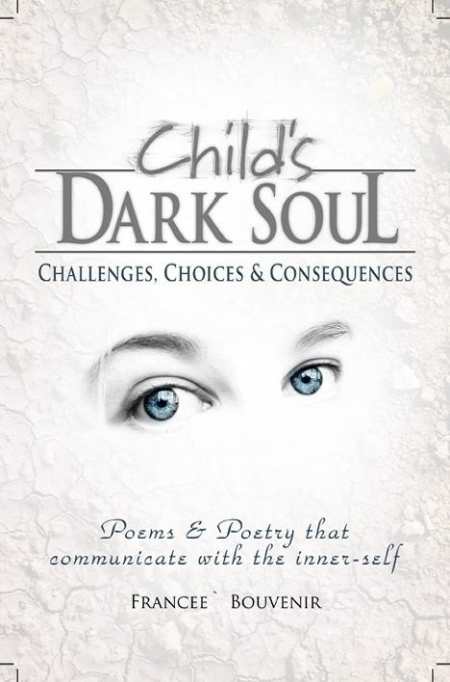Child's Dark Soul
Challenges, Choices & Consequences
Francee` Bouvenir’s poetry collection Child’s Dark Soul challenges readers to pay attention to the world’s injustices: racism, poverty, homelessness, and rape, among others. A Southern Poverty Law Center Wall of Tolerance honoree, Bouvenir uses poetry to empower readers to confront the shadows in their lives.
By pairing unattributed quotations with various poetic forms, Bouvenir creates a conversation between the pieces. For example, “Be Proud / Dark Side” begins with a speaker declaring, “I won’t give up on myself, and hide either … I will fight like I’m on fire.” The accompanying poem discusses someone who has realized that “fears had me broken down into tears” but that “knowledge is my strength.” The included quotations give the poem’s speakers—and readers—the inspiration they need to confront their demons.
Bouvenir’s prose poems include specific information and emotionally moving images, stories, and details. For example, “My African-Russian Ballerina” is full of rich descriptions of a mother watching her daughter “doing steps … like a soldier.” The poem ends with the mother speaking to her daughter, saying, “So dance girl, dance, never stops, show them what your mama made and what you had create by jumping and stumping that dance floor.” The mother in this coming-of-age poem wants her daughter to have a better life.
Another standout piece focuses on a young woman named Cleona “wearing a curly-like Afro with a substance free body.” In two lines, Bouvenir creates a character worth watching—“a college educator who works low-paying jobs … receives food stamps … lives in them projects.” The prose poem is memorable because Cleona holds her head up high even as the women judge her and the men feed her lines and “never walk her to the house.”
Acrostic poems form the first third of the collection. These pieces spell out messages using the first letter of a word at the start of each line. However, the formed words are also used in the poems’ titles, which dilutes the ideas Bouvenir is trying to convey. Similarly, Bouvenir uses boldface type and changes in font to emphasize ideas. The first letter of every line in “Be Earn/God’s Women” unnecessarily highlights that the openings spell out “God’s Women.” Such decisions undercut the poem’s meaning and make it seem as if the poet does not trust the reader to recognize the poetic form. In addition, the “dark soul” cliché in the book’s title is misleading because the poems seem to focus on survival rather than darkness. A more appropriate title would have used one of the book’s quotations.
Bouvenir’s collection explains that victims are not defined by tragedy. Instead, as the poet writes in the afterword, “It’s part of our human nature to save one another … No one should limit their lives.” The diversity of poetic forms employed by Bouvenir to explore this and other themes will certainly keep readers on their toes.
Reviewed by
Lisa Bower
Disclosure: This article is not an endorsement, but a review. The publisher of this book provided free copies of the book and paid a small fee to have their book reviewed by a professional reviewer. Foreword Reviews and Clarion Reviews make no guarantee that the publisher will receive a positive review. Foreword Magazine, Inc. is disclosing this in accordance with the Federal Trade Commission’s 16 CFR, Part 255.

